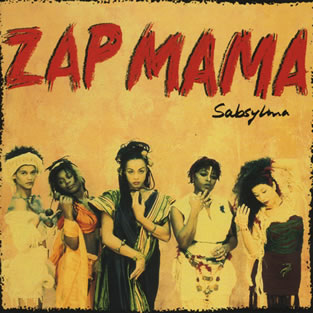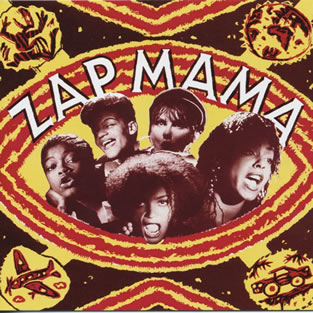
Originally released on Crammed in 1991, Zap Mama’s acapella debut album has become a classic, and influenced hosts of vocalists and musicians around the world.
The brainchild of founder and leader Marie Daulne, Zap Mama consisted at the time of five young women who, inspired by their mixed African/European origins and by the cosmopolitan environment of their hometown Brussels, created a wonderful acapella body of work incorporating influences drawn from Congolese pop, Arabic tunes, Pygmy polyphonics & more (including a touch of gospel and of medieval Spanish chants), guided above all by their wild imagination.
The beauty and freshness of their vocal harmonies, coupled with an entertaining and humorous live show generated tremendous enthusiasm worldwide. Audiences were conquered by their sound and personalities, by their formidable demonstration of the quasi-magical powers of the human voice, but also by the message which was implicitly conveyed: Zap Mama seemed to embody and glorify the virtues of joyful, creative and unfettered cultural blending. They unassumingly outlined the shape of a positive, forward-looking "identity" which could emerge from a personal and collective history which has often been convoluted, difficult and transcontinental.
That message seems to be as relevant today as it was then: the term “Afropea” (coined by Zap Mama leader Marie Daulne with David Byrne, on the occasion of the album’s reissue on the latter’s Luaka Bop label, with whom Crammed entrusted distribution in the US) is now being increasingly used, some 28 years after the initial release of the album. Among others by UK writer Johny Pitts, who credits this very word “Afropean” for helping him reframe his identity as a black European, and for prompting him to embark on a journey which led to his recent book Afropean: notes from Black Europe (see his notes on Zap Mama below).
Back in 1991, Zap Mama consisted of Sabine Kabongo, Sylvie Nawasadio, Cecilia Kankonda, Céline 'tHooft and Marie Daulne, the band's founder and main composer. The album was recorded in Brussels at Crammed's erstwhile in-house studio. It was produced by Vincent Kenis (known for his work with Konono N°1, Kasai Allstars, Staff Benda Bilili, Taraf de Haïdouks and many more), and coproduced by former band member Fanchon Nuyens (also former vocalist/bassist with Brussels rock band Des Airs). Incidentally, Zap Mama and Crammed's respective approaches were so obviously convergent that the two entities were meant to collaborate fruitfully…
Zap Mama/Adventures in Afropea became one of Crammed’s all-time best selling records. It was nominated for a Grammy, and topped the Billboard’s world music chart. Zap Mama toured on all continents, and recorded a 2nd album for Crammed in 1994. Marie Daulne then continued on her own, went on to record six more (largely non-acapella) albums, always pursuing her transcultural trajectory and working on building bridges between Europe, America and postcolonial Africa.
Author Johny Pitts on Zap Mama/Adventures in Afropea:
Afropea; not just a portmanteau but a portal! To enter into it through the music of Zap Mama is to be transported into a liminal and all too often invisible space where the line between Africa and Europe, black and white, West and South is and has always been blurred.
When Marie Daulne first emerged during the ‘World Music’ boom of the late 20th century, she was embraced by a west that saw itself as heroes of the planet - around the time of the fall of communism and the Berlin Wall, when global travel became more accessible and a Generation X that had inherited colonial wealth and hegemony gave birth to a backpacking culture that looked out at the rest of the world with optimism and, often, naivety. It was an interconnectedness that was lopsided.
The Zap Mama project, however, was always much deeper than a blind celebration of the coming together of cultures, and rather a tuning into the facts of the matter; at times unsettling and discordant, at other times euphoric and rapturous. Sometimes the melodies are peaceful and consoling, often the polyphonic harmonies are chaotic and complex. The music is always transcendent.
When I first heard Zap Mama, it asserted with confidence a blackness in Europe that wasn’t going ‘back’ anywhere any time soon, one that was respectful of multiple traditions and influences, but also found form as a fusion that was fresh and forward-looking. Perhaps for the first time in my life, as a black European I was encouraged to think of myself as whole and unhyphenated, and encoded in the recordings was a map of a Europe rarely exported in the official narrative of the continent. Indeed, when David Byrne was on tour in Europe with the Talking Heads in the early 90s he was surprised by what he called a ‘reverse colonisation’ taking place. He immediately recognised Zap Mama as one of the most coherent and original manifestations of a postcolonial generation coming of age, and wished to reissue their debut album in the USA.
Zap Mama sung this imaginative geography ‘Afropea’ into existence, but that’s not to say this landscape isn’t rooted in reality, tracing the contours of a physical Black European geography and putting it on the map. The project was born in Matongé, the Congolese neighbourhood of Brussels where Marie Daulne was raised, but it also speaks of lived experiences in Peckham in London, Rinkeby in Stockholm, Chateau Rouge in Paris, Le Panier in Marseille, and so many other areas that have been, to quote Frantz Fanon; ‘woven out of a thousand details, anecdotes and stories’ in the mythology of Europe.
With so much social commentary in this information age, that shouts so loudly but says so little, Zap Mama creates a living breathing dialogue, full of humour, abstraction and beauty, that suggests togetherness, invokes possibilities and insists on plurality. It is work that, in such a divided time, is more urgent and essential than ever.
Johny Pitts, author of Afropean: Notes from Black Europe










